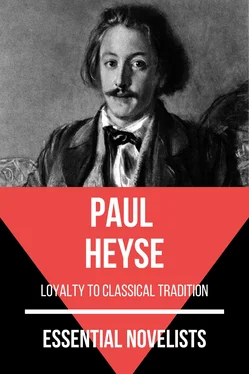"A little longer, a few weeks perhaps, who knows? Afterwards—what will come afterwards nobody can tell. But if it seems like a fairy tale, be kind and wise enough to let it remain so, do not seek to penetrate any farther into my life, so that I shall be forced to explain the connection. There's nothing very remarkable concealed in it, at least nothing particularly pleasant or cheerful. I'm really glad that I have made your acquaintance; I was too much alone, and in my situation I must beware of all persons whom I cannot implicitly trust. Why I have confided in you, I do not know; but so it is, and I should really be grieved if you did not think well of me, or if you were deterred from coming again in consequence of my frank expressions of opinion in regard to the various things I read or experience. And you must not come too often. I do not wish to cause gossip among the people in the house; but two or three times a week about this hour, before it is time to go to the theatre—only you must not first get your dinner at home. Will you promise me that?"
She rose and held out her hand, which he hastily grasped and pressed cordially in his own.
"May the meal be blessed to you!" she said smiling. "We always said that in my parent's house, and I miss it here. Jean has too much respect for me, and the birds cannot be taught to do it. So I shall see you again soon, and you will bring Göthe's other works, of which you have spoken?"
He bowed silently, involuntarily placing his hand on his heart, and in a very puzzled mood left her.
Just as he emerged from the house, a light carriage drove up; the gentleman, who had himself held the reins threw them to the servant sitting behind and sprang out with the laughing exclamation: "Doctor, are you mad?"
"Marquard! Is it you? Have you a patient in this house?"
"Only one, who as I see, is making my efforts superfluous by taking the cure into his own hands. Or have you not just come from her?"
"From her? I don't understand you."
"Hypocrite! As if I did not see the fire in your heart burning through your vest" (Marquard was fond of quoting from Heine.) "My dear fellow, you won't find it so easy to deceive an old diagnostician of my stamp. But how the deuce did you get on her track again?"
"Let's walk a few steps down the street," said Edwin coloring. "The windows are open, every word can be heard up stairs."
He seized the doctor by the arm and drew him away, relating in an undertone the story of the lost book-mark, and leaving it in doubt whether the accident had brought him here to-day for the first time. "And you," he hastily concluded. "How did you discover that our neighbor in the box at the theatre lived here?"
"By means of the vein I laudably struck," declaimed the doctor. "The renewal of my acquaintance with this fair Sphinx is only two days old, and I fear it will not long survive the third. Day before yesterday, while visiting a patient in one of the opposite houses, I was suddenly summoned from his bedside; a boy was dangerously ill; I must come as soon as possible to the very house before which we just met. How I scaled the staircase and entered the second story rooms on the wings of my professional duty—a doctor is an enviable person, Edwin! All doors open to him, while to you ordinary mortals they only unclose when you knock as honest finders of property, or—rascally seekers. Imagine my joyful surprise, when the fair enigma who had so icily dismissed me in the box, now hastily approached and in the confusion of terror claimed my assistance.
"Was she ill?"
"Not she herself But she has a lad in her service, a ridiculous little fellow, who had already amused me greatly when he summoned me from the other side of the street. The mysterious stranger—who at any rate seems to have a kind heart, especially for minors—had allowed her footman to invite a younger brother to dine with him, and the two precocious men of the world had consumed a bottle of Cape wine and smoked some horrible cigars. The striped waistcoat's stomach, already hardened to such sins, endured the orgy without injury, while the hopeful Jean junior lay like a broken lily on his brother's bed, and had frightened the young lady, who had not the least suspicion of the cause—the young tipplers had carefully put the bottle away—almost to death. Now I could not possibly do Jean—who was leering significantly at me, and had taken me into his confidence on the way—the injury of making light of the case. Besides, successful cures of difficult cases are a greater recommendation to a young physician, than the treatment of the sickness that follows a drunken spree. So I took the pallid scamp to his unsuspicious parents in my own carriage, and yesterday reported his rapid progress toward convalescence. I'm now just in the act of giving the second bulletin; but as, when I left him, the patient was eating pears and dumplings with the best possible appetite, and his noble patroness intends to visit him herself, you can understand that I shall not be able to pay many more visits to the fairy castle; for which I am very sorry—especially on your account, since according to promise—"
"I have just told you—"
"That you're a Cato or a Plato, whichever you prefer. Meantime—even without having felt your pulse—I see by your whole appearance, that you're on the direct road to remain so no longer. My best blessing on your conversion, old boy, and better luck than has fallen to me."
"To you?"
"Well, you may suppose that during my visit yesterday, I made every effort to appear not only the experienced physician, but also the profound connoisseur in female hearts and female beauty. Oleum et operam, my dear fellow! A statue, I tell you, a marble Sphinx would have been more moved by my engaging manners. This young glacier in Brussels lace remained as unapproachable as on the first evening, and will you believe it: even my secret ally, Jean the Little, who ought to be grateful—is a rocher de bronze in everything that concerns his mistress. The maid, my last hope, did not appear. So I'm just as wise to-day as I was before, or rather still more stupid, for all my experience and psychology have not helped me to understand our solitary beauty, or make up my mind whether she belongs to the great world, the demi monde, or no world at all."
"There can be no lack of people who will help you on the trail."
"Perhaps others know more," said the doctor, as he paused and cleaned his spectacles. "Meantime, as I told you just now: I give her up. I hereby relinquish her to you for the second time and forever, and swear by yonder turrets, that it does not even cost me an effort. She's an amphibious creature, a beautiful, faultless young serpent, just fit to drive men mad. I prefer warm, red blood. I've discovered some one—curiously enough in your house—a soubrette, who takes lessons from your piano-playing young lady—not by any means so exquisite or princess like as our sphinx, but to make amends—you know 'we don't cry for the moon' unless we are incorrigible idealists and star gazers, like certain people."
He laughingly shook hands with Edwin and entered the house before which his carriage was waiting.
––––––––
EVER SINCE THE DAY mentioned in the last chapter, Edwin had become a regular dinner guest at the house in Jägerstrasse. He came every third day, but could never be induced to encroach upon little Jean's share of the remains of the meal any farther than he had done the first time. He dined as it were symbolically, by dipping a biscuit in the dainty glass which the young hostess filled with Spanish wine. If she asked him why he would never gratify her by really eating, he pleaded his old fashioned custom of dining at noon. In reality, his feelings rebelled against being so luxuriously entertained in the fairy castle, after having merely been a spectator at the scanty meal in the "tun." Besides, he was now separated from Balder so often and so long, that he wished at any cost to keep their cosy dinner hour, where jesting with Reginchen roused him a short time from his reveries. Yet it happened more and more frequently, that his evenings were not spent at home. True, his fair friend always dismissed him just before she went to the theatre, and neither invited him to accompany her nor gave him any hope of seeing her afterwards. But the hour spent in talking with her, during which he played the part of the calm, clever thinker, her "wise friend," as she jestingly called him, left his soul in a state of agitation, a fever of doubt, longing, gloom, and happiness, which he was forced to calm by long, lonely walks, before he could associate with others again.
Читать дальше












